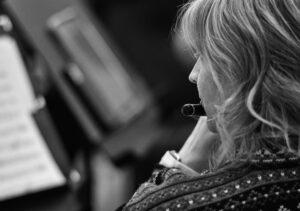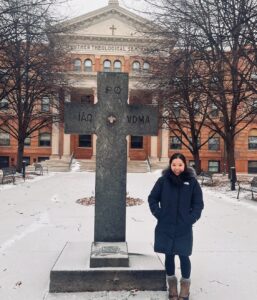Recent Luther Seminary graduates Leslie Pietila and Kristy Hu join an illustrious group of Children, Youth, and Family Ministry graduates who received the CYF Prize for their scholarly work. Leslie was recognized for her paper “The Importance of Music in Faith Formation: Hermeneutic Study on the Impact of Children’s Sacred Music on Faith Formation,” and Kristy Hu for her paper “Cultivating Holistic Family Faith in an Age of Anxiety and Secularism.”
The CYF prize is given annually to one or more students who demonstrate excellence in reflecting theologically, culturally, and pragmatically on the practice of children, youth, young adult, adult, or family ministries.
Leslie Pietila
Where did you grow up, what did you study as an undergraduate, and what led you to pursuing theological education?
I was born and raised in Los Alamos, New Mexico. I came to Minnesota to attend college at Gustavus Adolphus and have lived in the state ever since. Growing up, I was very active in my church and took on many leadership roles. My pastor made a passing comment to me after my high school graduation that he thought I would make a good pastor. I laughed it off, but that thought always lingered in the back of my mind. I got married and had three children, but I continued to return to the idea of attending seminary. Three years ago, the timing was right, and things fell into place for me to begin the M.A. in Children, Youth, and Family.
What are you hoping to do with your Luther Seminary degree?
I’m not exactly sure what “the next step” is for me. I am trying to lean into God’s plan and trust where life takes me.

Tell us about the paper you submitted for the CYF prize. Why did you want to dig into this topic?
I currently serve at a small church as Director of Children’s Music. My focus in this ministry role is to help children learn about and explore their relationship with God through music. I am also an active musician here in the Twin Cities and regularly play the flute. Music has had a profound influence on my life, and for this thesis paper, I wanted to explore the impact of music on faith formation in children. When used to teach about a relationship with God, music helps children develop spiritual language, understand their identity as children of God, and build a strong foundation for growing in their faith.
How would you contextualize this piece of scholarship with your overall scholarly work here at Luther?
Integrating what I have learned throughout my program at Luther Seminary with my passion for music and faith formation among children has been a special and meaningful experience. Much of children’s ministry should focus on building relationships and helping children develop and recognize a personal connection with Jesus in their daily lives. In my paper, I touched on the cognitive, psychological, and emotional impact of music, as well as the importance of strong spirituality in children. Music provides an emotional space for children to experience God’s love, and it has a grounding element that reorients their understanding of their place in the world.
What’s one thing people don’t know about you?
I love to read. Last year, I read 218 books!
Kristy Hu
Where did you grow up, what did you study as an undergraduate, and what led you to pursue theological education?
I was born in Taiwan and raised between cultures, constantly navigating the intersections of east and west, faith and secularism, belonging and difference. Growing up amid different faith traditions, I learned early on to listen deeply, ask hard questions, and hold space for complexity. I completed my undergraduate studies in music and education, believing for many years that my vocational path was in teaching and child advocacy.

But over time, I began to sense a deeper unrest—an ache that extended beyond the immediate needs of the families I served and into my own spiritual life. I observed a recurring pattern: parents overwhelmed by daily pressures, children struggling to find connection and meaning, and churches earnestly attempting but often struggling to transmit faith in ways that felt relevant or life-giving. I realized that what I longed for was not just more effective programming, but a more holistic and grounded spiritual home—one where faith is not only taught but lived. That longing led me to Luther Seminary, where I sought to explore how theology could meaningfully engage with the complexities of real life, particularly within the context of family.
What are you hoping to do with your Luther Seminary degree?
My vision is to cultivate a new kind of faith community—one that doesn’t begin with buildings but with homes, gardens, and backyards. I’m currently developing Rooted: Backyard Church & Family Retreat, a Spirit-led movement centered on spiritual formation, worship, and sensory-informed healing. This initiative supports families who feel disillusioned by traditional church structures and long to reconnect—with God, with one another, and with the sacredness of everyday life. At the heart of my work is a deep commitment to restoring connection in a world that often fragments our relationships with God, ourselves, and each other. I believe faith isn’t something we pass down solely through instruction—it’s something we practice and embody together through shared rhythms and lived experience.
This conviction shapes my ministry philosophy: We are not simply called to raise children in church—we are called to raise them in Christ. That means embodying grace and truth not only in structured worship settings, but also within the ordinary, often messy, and sacred moments of everyday family life.
Tell us about the paper you submitted for the CYF prize. Why did you want to explore this topic?
My paper, “Cultivating Holistic Family Faith in the Age of Anxiety and Secularism,” emerged from the central questions I carry as a parent, ministry leader, and educator. I’ve seen families arrive at church burdened by anxiety, exhaustion, and spiritual dryness—not because they lack desire, but because they feel a disconnect between their faith and the pace of everyday life.
This raised a critical question for me: What if the home could once again become the primary sanctuary? What if spiritual formation began not with content, but with grace?
In this paper, I draw on the metaphor of the cruciform life—a life shaped by the cross—to reimagine family faith formation through three theological movements: reconciliation, restoration, and transformation. This paper is deeply personal. It reflects my hope to offer families a vision of faith rooted not in guilt or performance but in hope, grace, and the renewing love of God.
How would you contextualize this piece of scholarship within your broader academic work at Luther?
This paper embodies the heart of my theological journey at Luther. From the beginning, my academic focus has centered on the intersection of deep theological reflection and the lived realities of family life. I have been especially influenced by the work of Andy Root, a leading theologian in the field of practical theology. Dr. Root’s work focuses on youth ministry, secularism, and the theology of relational presence. He helps the church meaningfully engage people—especially young people—in a world shaped by disenchantment, busyness, and a loss of transcendence. His emphasis on divine presence—over programming or performance—has deeply informed my vision of ministry in this cultural moment.
I’ve also drawn from Charles Taylor’s critique of secular time, Jürgen Moltmann’s theology of hope, and Dietrich Bonhoeffer’s vision of incarnational discipleship and life together. Bonhoeffer’s theology has been especially formative in shaping my understanding of Christian community as grounded in grace, not idealism. His emphasis on life together calls us to be faithfully present with one another—not as perfect people, but as people held together by Christ’s presence in our shared vulnerability. His vision of costly grace and the cross-shaped life invites families and churches to move from performance toward presence.
These voices have helped me wrestle with questions like: How do we sustain connection with God in a world marked by fragmentation and distraction? How can families nurture faith in a culture dominated by anxiety, busyness, and emotional disconnection?
Through my studies, I’ve come to believe that spiritual formation doesn’t begin by fixing children or optimizing church systems. It begins with a return to Christ. We don’t simply raise children in church—we raise them in Christ. That means anchoring their lives in God’s love rather than in behavioral expectations, practicing grace in the midst of struggle, cultivating rhythms of reconciliation, restoration, and transformation through everyday life.
Though my work is both theological and pastoral, it is ultimately shaped by a deep hope: that every family might come to know they are seen, deeply loved, and never beyond the reach of God’s grace.
What’s something people don’t know about you?
I’m a classically trained pianist—and I have been teaching piano lessons for 18 years. Music has been part of my life since childhood. It’s how I first learned to listen—not just to sound, but to silence, emotion, and presence. That kind of attentiveness continues to shape how I hear God, how I parent, and how I hold space for others in ministry and daily life.
I’m also fluent in both Mandarin and English, which allows me to bridge cultural and linguistic gaps in both ministry and everyday relationships. Being able to move between two languages—and two worlds—has been a gift in connecting with families across diverse backgrounds.
And a fun fact: I have two young sons who are just 11 months apart—to be more exact, actually 10 months and 14 days! Our home is full of laughter, noise, and what I lovingly call “sacred chaos.” And in the middle of it all, God still breathes—through the mess, the music, and the moments we least expect.